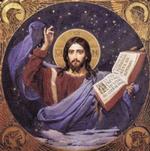Fathers of the Church
From Festal Letter XXXIX
by Athanasius in 367 | translated by Payne-Smith
[Of the particular books and their number, which are accepted by the Church. From the thirty-ninth Letter of Holy Athanasius, Bishop of Alexandria, on the Paschal festival; wherein he defines canonically what are the divine books which are accepted by the Church.]
.... 1. They have fabricated books which they call books of tables, in which they shew stars, to which they give the names of Saints. And therein of a truth they have inflicted on themselves a double reproach: those who have written such books, because they have perfected themselves in a lying and contemptible science; and as to the ignorant and simple, they have led them astray by evil thoughts concerning the right faith established in all truth and upright in the presence of God.
.... 2. But(2a) since we have made mention of heretics as dead, but of ourselves as possessing the Divine Scriptures for salvation; and since I fear lest, as Paul wrote to the Corinthians, some few of the simple should be beguiled from their simplicity and purity, by the subtility of certain men, and should henceforth read other books—those called apocryphal—led astray by the similarity of their names with the true books; I beseech you to bear patiently, if I also write, by way of remembrance, of matters with which you are acquainted, influenced by the need and advantage of the Church.
3. In proceeding to make mention of these things, I shall adopt, to commend my undertaking, the pattern of Luke the Evangelist, saying on my own account: 'Forasmuch as some have taken in hand,' to reduce into order for themselves the books termed apocryphal, and to mix them up with the divinely inspired Scripture, concerning which we have been fully persuaded, as they who from the beginning were eyewitnesses and ministers of the Word, delivered to the fathers; it seemed good to me also, having been urged thereto by true brethren, and having learned from the beginning, to set before you the books included in the Canon, and handed down, and accredited as Divine; to the end that any one who has fallen into error may condemn those who have led him astray; and that he who has continued stedfast in purity may again rejoice, having these things brought to his remembrance.
4. There are, then, of the Old Testament, twenty-two books in number; for, as I have heard, it is handed down that this is the number of the letters among the Hebrews; their respective order and names being as follows. The first is Genesis, then Exodus, next Leviticus, after that Numbers, and then Deuteronomy. Following these there is Joshua, the son of Nun, then Judges, then Ruth. And again, after these four books of Kings, the first and second being reckoned as one book, and so likewise the third and fourth as one book. And again, the first and second of the Chronicles are reckoned as one book. Again Ezra, the first and second(4a) are similarly one book. After these there is the book of Psalms, then the Proverbs, next Ecclesiastes, and the Song of Songs. Job follows, then the Prophets, the twelve being reckoned as one book. Then Isaiah, one book, then Jeremiah with Baruch, Lamentations, and the epistle, one book; afterwards, Ezekiel and Daniel, each one book. Thus far constitutes the Old Testament.
5. Again it is not tedious to speak of the [books] of the New Testament. These are, the four Gospels, according to Matthew, Mark, Luke, and John. Afterwards, the Acts of the Apostles and Epistles (called Catholic), seven, viz. of James, one; of Peter, two; of John, three; after these, one of Jude. In addition, there are fourteen Epistles of Paul, written in this order. The first, to the Romans; then two to the Corinthians; after these, to the Galatians; next, to the Ephesians; then to the Philippians; then to the Colossians; after these, two to the Thessalonians, and that to the Hebrews; and again, two to Timothy; one to Titus; and lastly, that to Philemon. And besides, the Revelation of John.
6. These are fountains of salvation, that they who thirst may be satisfied with the living words they contain. In these alone is proclaimed the doctrine of godliness. Let no man add to these, neither let him take ought from these. For concerning these the Lord put to shame the Sadducees, and said, 'Ye do err, not knowing the Scriptures.' And He reproved the Jews, saying, 'Search the Scriptures, for these are they that testify of Me.'
7. But for greater exactness I add this also, writing of necessity; that there are other books besides these not indeed included in the Canon, but appointed by the Fathers to be read by those who newly join us, and who wish for instruction in the word of godliness. The Wisdom of Solomon, and the Wisdom of Sirach, and Esther, and Judith, and Tobit, and that which is called the Teaching of the Apostles, and the Shepherd. But the former, my brethren, are included in the Canon, the latter being [merely] read; nor is there in any place a mention of apocryphal writings. But they are an invention of heretics, who write them when they choose, bestowing upon them their approbation, and assigning to them a date, that so, using them as ancient writings, they may find occasion to lead astray the simple.
Taken from "The Early Church Fathers and Other Works" originally published by Wm. B. Eerdmans Pub. Co. in English in Edinburgh, Scotland, beginning in 1867. (NPNF II/IV, Schaff and Wace). The digital version is by The Electronic Bible Society, P.O. Box 701356, Dallas, TX 75370, 214-407-WORD.






